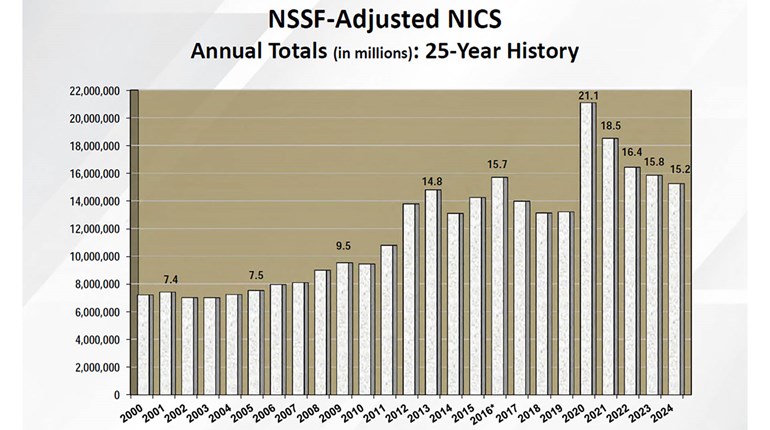
When President Barack Obama unveiled his latest, greatest, anti-gun “let’s prevent crimes by creating new crimes” campaign, a central component of that push was expanded background checks for firearm purchasers. In fact, the White House has called those background checks the “most important tool” for stopping gun-related crimes.
Indeed, for more than 20 years now, it’s been an article of faith among the gun-ban lobby, anti-gun politicians and the so-called “mainstream” media that the background checks conducted on firearm purchasers have stopped criminals, prevented them from getting guns and thus prevented violent crime.
But is it true? Every one of the country’s mass shooters since January 2009 could have slipped through the background check system. – Washington Post
Does the National Instant Criminal Background Check System (NICS) actually stop criminals from getting guns? Is it worth the over $650 million that has been spent on it, and $40 million per year to run it? And is it worthwhile expanding that program to cover—supposedly—every firearm transfer in America?
The truth is that background checks don’t prevent criminals from obtaining firearms, since many, many convicted criminals are not flagged by the NICS system. As NRA Executive Vice President Wayne LaPierre pointed out in a video statement this month, 38 states submit less than 80 percent of their felony convictions to the NICS system, meaning that 7 million convicted criminals are invisible to the background check system.
Background checks also don’t stop criminals from trying to obtain firearms—convicted criminals who are caught trying to buy firearms are almost never prosecuted for that crime, which means they’re free to go ahead and get firearms elsewhere. Again, as LaPierre pointed out, in 2010 approximately 80,000 people who are barred by federal law from even attempting to buy a gun did just that. But do you know how many of them were prosecuted for the federal felony of trying to buy a gun? Just 44. Less than one-tenth of 1 percent!
Background checks don’t reliably prevent the mentally ill from obtaining firearms, since the records of countless people who have been adjudicated mentally incompetent are not in the NICS system. Why not? Because many states refuse to put those records into the system.
As the Washington Post has reported, the U.S. Department of Justice has given out at least $56 million in grants to states to get them to improve their mental health reporting. Yet some states, including some of the most hostile states toward the right to keep and bear arms, would rather deny the Second Amendment rights of all their citizens than flag the tiny proportion of their residents who have been adjudicated mentally incompetent. Massachusetts, for example—despite receiving more than $2 million in Justice Department grants—submitted a grand total of one record to the NICS system.
And background checks wouldn’t have prevented the rare but relentlessly covered cases of mass shootings in this country, since almost all of those killers either passed their background checks or obtained their firearms through other means, such as theft or the black market—which is how the vast majority of armed criminals obtain their guns.
A little over a year ago, the Washington Post reported that “Every one of the country’s mass shooters since January 2009 could have slipped through” the NICS system. And who did the Washington Post cite as their source? None other than Michael Bloomberg’s own gun-ban group, Everytown for Gun Safety, which released a report in July 2014 that came to that conclusion.
More recently, last month the Washington Post “Fact Checker” parsed the statement by U.S. Sen. Marco Rubio that “None of the major shootings that have occurred in this country over the last few months or years that have outraged us, would gun laws have prevented them.” The Post’s verdict? “Rubio’s statement stands up to scrutiny,” the Post said, concluding that “He earns a rare Geppetto Checkmark”—meaning that they could find nothing wrong with what he’d said. So why do President Obama and the anti-gun press and political class continue to push for expanding a program proven to have gaping holes?
As even the reflexively anti-gun New York Times pointed out, the firearms used by the San Bernardino killers; the Umpqua Community College killer; the Roanoke, Va., TV reporter-killer; the Lafayette, La., movie theater killer; the Charleston, S.C., church killer; the Marysville, Wash., high school killer; the killers in both of the Fort Hood massacres; the Washington Navy Yard killer; the Sandy Hook killer; the Milwaukee Sikh temple killer; the Aurora, Colo., theater killer; the Oikos University killer; the Tucson, Ariz., killer; and the Binghamton, N.Y., killer—were all purchased with background checks.
The national media might finally be admitting the truth, but there’s nothing “new,” or even particularly surprising, about the revelation that laws don’t affect the lawless.
For instance, a 2000 study published in the Journal of the American Medical Association—which had a long history of publishing misleading “studies” that support more gun control—concluded that “the Brady Act [which mandated waiting periods and, later, criminal background checks for firearm purchasers] appears not to have been associated with reductions in homicide rates or overall suicide rates.”
What’s more, in a 2003 review of existing research, a CDC task force found “inconsistent findings” on whether or not background checks work (“some studies indicated decreases in violence associated with restrictions, and others indicated increases”) and noted the obvious but often glossed-over fact that “denial of an application does not always stop applicants from acquiring firearms through other means.”
So why do President Obama and the anti-gun press and political class continue to push for expanding a program proven to have gaping holes?
Maybe because it supports their ultimate, long-term objectives.
Consider this: In 1976, the Brady Campaign, which then was known as the National Council to Control Handguns, said that it envisioned handgun registration as the second step in a three-step plan to ban the private possession of handguns. The chairman of the group, Nelson T. “Pete” Shields, said: “The first problem is to slow down the increasing number of handguns being produced and sold in this country. The second problem is to get handguns registered. And the final problem is to make the possession of all handguns and all handgun ammunition—except for the military, policemen, licensed security guards, licensed sporting clubs and licensed gun collectors—totally illegal.”
As common sense tells us, the only way such gun confiscation can proceed is if the government has a list of guns and who owns them. And as history proves, gun registration—no matter how benign its justifications might sound at the time—ultimately leads to gun confiscation.
Gun registration lists have been used to confiscate lawfully owned firearms in Australia, Bermuda, Cuba, Germany, Great Britain, Greece, Ireland, Jamaica, Soviet Georgia and other countries—not to mention California and New York City.
In 1967, New York City passed a law requiring that rifles and shotguns be registered. In 1991, after banning many semi-automatic shotguns and rifles, the city used those gun registrations to contact lawful gun owners and demand that the firearms be surrendered, rendered inoperable or taken out of the city.
California did much the same thing. In 1989, the state banned many semi-automatic firearms, but put in a “grandfather clause” allowing existing owners to keep the guns if they registered them. A decade later, California used those same registration lists to demand that gun owners destroy the guns, disable them, move them out of state or surrender them to the police.
So how do we get from “universal background checks” to gun registration? Do the math. Connect the dots. Ask yourself how such a law could ever be enforced.Requiring background checks for all firearm transfers “depends on … requiring gun registration.” – President Obama’s Department of Justice
Imagine Bill Badguy, a convicted felon, gets caught committing a crime while possessing a firearm with the serial number 7654321. Prosecutors want to know how a convicted felon obtained the firearm, because they believe someone, somewhere, must have sold it to Bill Badguy without doing a background check.
The only way they can prove, in court, that someone transferred that gun to Bill Badguy without a background check is if they have a way to know who lawfully owned that gun before Bill Badguy got it.
In other words, the only way to require that every firearm transfer be checked ... is to have a way to check the identity of the owner of every firearm. And that requires government registration of every gun owned by every gun owner. There is simply no way around it.
Indeed, mere minutes after President Obama spoke of background checks in his 2013 State of the Union address, U.S. Sen. Charles Schumer “admitted to MSNBC that the long-term goal was “universal registration.”
Schumer might have made a slip of the tongue, but the fact is, even Obama’s Justice Department admitted in January 2013 that background checks on all firearm transfers “depends on … requiring gun registration.”
That should send a chill down the spine of anyone who cares about their Second Amendment right to keep and bear arms—or any of our other freedoms that the Second Amendment guarantees.
And it should cast an entirely new light on President Obama’s reply to CNN’s Anderson Cooper when he asked, “Is it fair to call it a conspiracy?” during his “town hall” event on Jan. 7.
“I’m sorry, Cooper. Yes, it is fair to call it a conspiracy,” Obama said. “Are you suggesting that the notion that we are creating a plot to take everybody’s guns away so that we can impose martial law, is a conspiracy? Yes, that is a conspiracy! I would hope that you would agree with that.”
Obama may have tried to turn the whole discussion into a joke, but the American people aren’t laughing.

|
Use Your Power!
With President Obama, Hillary Clinton and more and more state governors vowing to use executive orders to impose more gun control with or without the consent of the people’s elected representatives, this November’s elections are the only way we can stop them. To get in touch with your local NRA election volunteer coordinator and make a difference on Election Day,
click here.
|


































